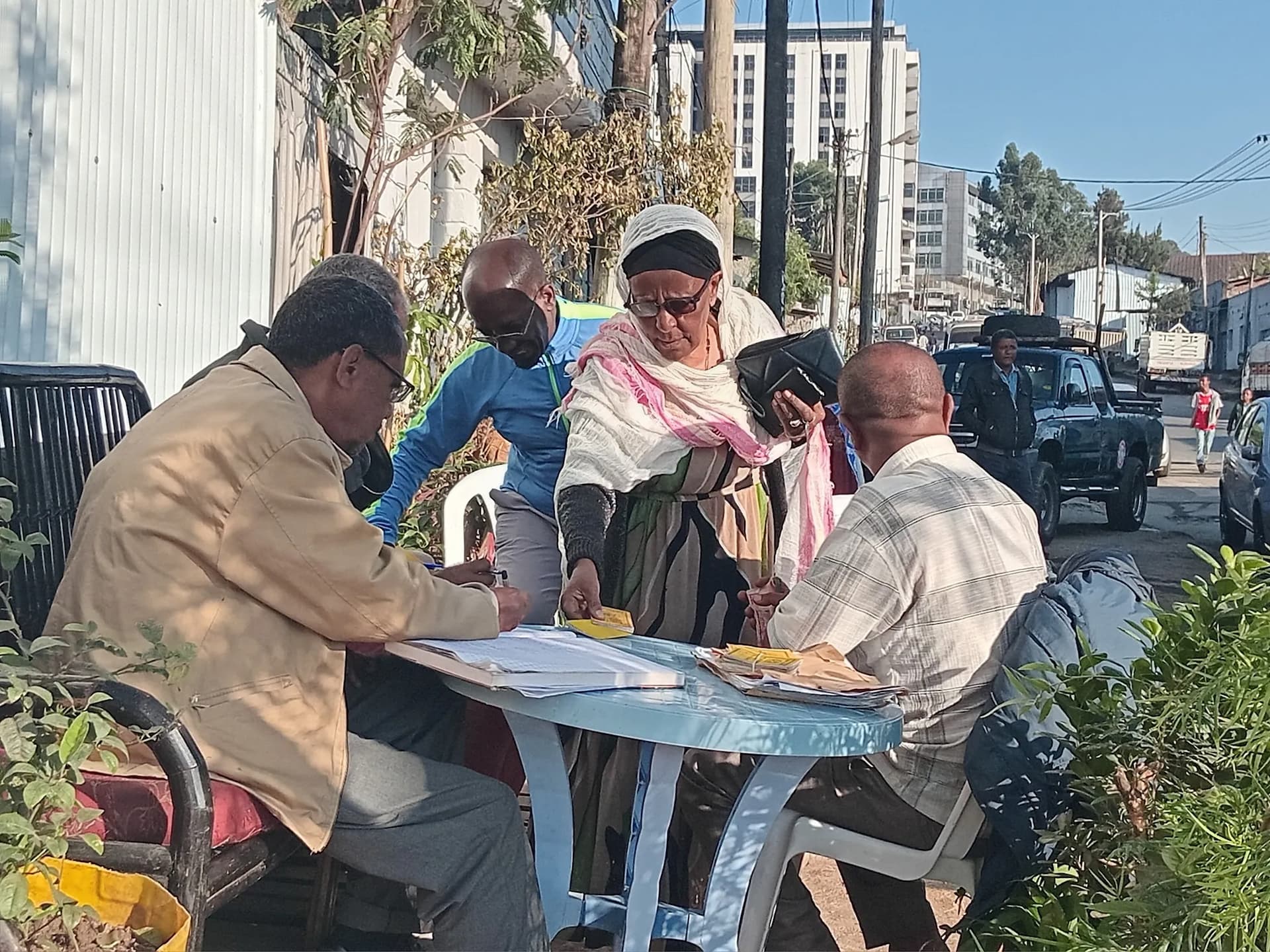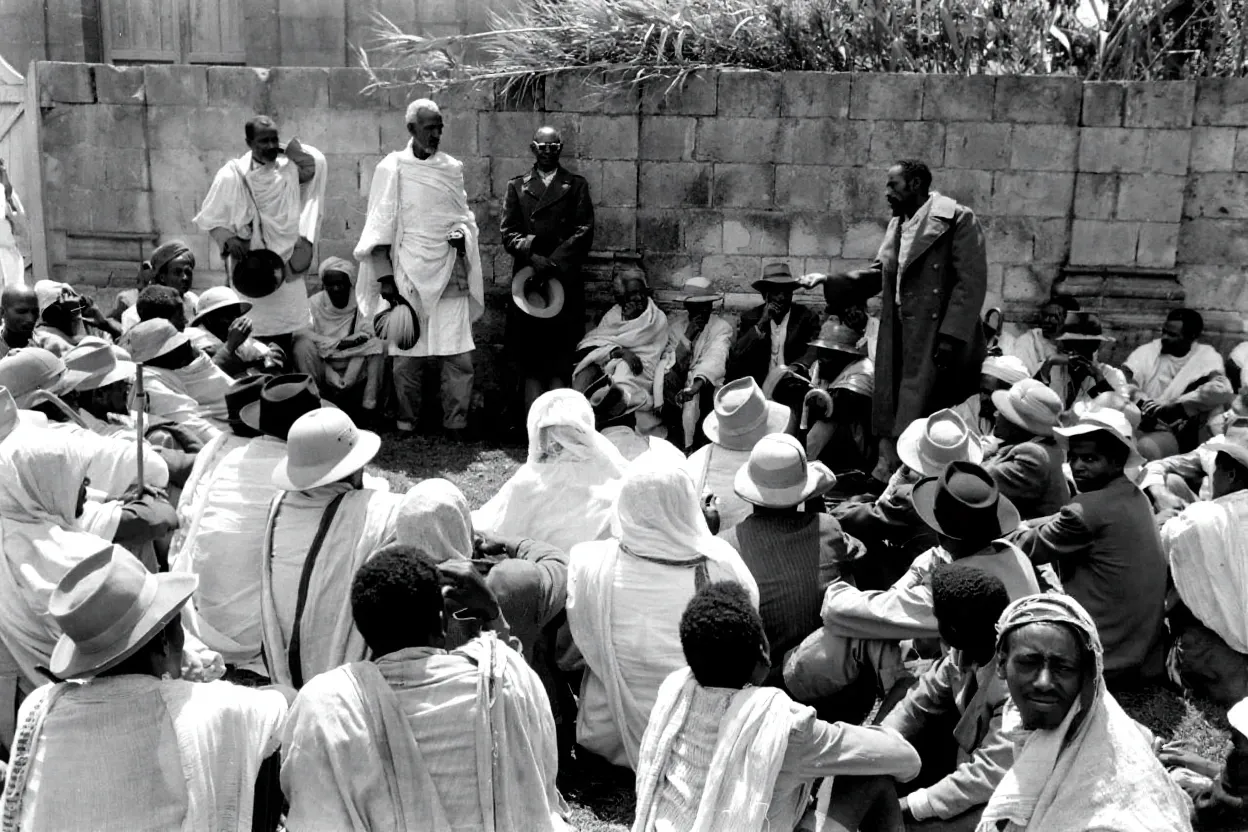Progress for 0 ad
Progress for 1 ad
Progress for 2 ad
Progress for 3 ad


Hasset Abebe
Addis Ababa, Ethiopia

When Genet Abebe’s husband passed away a few years back, her Edir, an informal mutual aid community network common in Ethiopia, provided her with more than just a financial lifeline. Over weeks of mourning, members who had bonded over two decades comforted the mother of four, staying close as she grieved.
“They never left my side”, she recalls. “We are more than a family.”
Each month, the few dozen members gather over coffee to catch up and plan how they will handle an upcoming wedding, funeral, or any emergency faced by one of them. Like all Edirs, they rely on modest periodic contributions to cover costs. What the funds don’t cover is compensated for by the culinary skills and acumen of the group, predominantly comprised by fellow mothers. But Genet regards Edir as more than a mechanism to pool funds for ceremonies; she anchors her sense of motherhood in the communal friendship.
“We hold each other up,” she says.
Unfortunately for Genet, her daughters don’t share her strong sentiments. She observes in them a tendency to prefer commercially oriented institutions over her generation's preferences for community networks. Her eldest, Bethelem Negusie, a thirty-year-old marketer with a busy schedule, believes Edir does not suit urban lifestyles. She finds herself relying more on catering services and a formal financial institution for sudden costs.
“Everyone lives separately nowadays,” Betelhem says. “It’s tough to build the social bonds of Edir.”
She notes the importance of evolving the traditional network to contemporary needs. Digital Edirs or social groups fitted with tools for cooperation and networking feel to her like a viable path. Betelhem stressed the importance of blending the old with the new to meet the priorities of the new generation of youth.
The history of urbanization across the globe echoes Betelhem’s experience. Several studies show how traditional, close-knit rural social networks based on kinship tend to weaken with the growth of cities. Young urbanites opt for formal enterprises, communities based on shared interests, and are even less bothered by isolation. Interestingly the first Edirs in Ethiopia have been traced back to migrants to Addis Ababa in the early part of the 20th century by some studies. A 2024 survey by Kotebe Metropolitan University, commissioned by the Addis Ababa Women, Children & Social Affairs Bureau, counted 6,796 Edirs in the capital alone.
However, Ethiopia’s Edirs are facing challenges more extensive than the inability to attract a new generation of prospects. Inflation, which scorched above 30% in 2022 and 2023 before easing to 17% by late 2024, has crimped their coffers, forcing leaner ceremonies: Fewer trays and limited offerings.
The economic strain is especially felt by long-standing Edirs that have endured for decades. Seventy-five-year-old Girma Gidey, a member of the Yetimkete Bahir Wendemamoch Edir for more than 30 years, has seen repeated price adjustments as the group tries to keep pace with rising costs, though he says it’s never enough.
“Many Edirs in Addis Ababa collect about 100 birr per month from members,” he says. “When a member dies, the family typically receives around 20,000 Birr, depending on the Edir.”
Some Edirs pay as much as 50,000 Birr, he adds, but these are rare and usually formed around economic associations, such as shareholder groups.
Still, Girma says the payouts fall short of covering funeral expenses.
“Burial alone costs at least 30,000 Birr,” he explains. “That includes the coffin, funeral car, and payments to the church or burial site.”
Even modest ceremonies can strain a family’s budget. “If the family doesn’t host lunch and only serves water, coffee, and Nifro (boiled beans, peas, and chickpeas) that’s another 30,000 Birr,” he says. “Adding a simple meal can push the total up by another 100,000 Birr.”
His Edir, having seen families fall into debt to host meals, now discourages members from organizing lunches after funerals.
Conversely, Selam Tefera, 38, owner of Agelgel Catering, has noticed a significant shift in her client base over the past few years. She says more and more families are reaching out to their service in recent years, as opposed to the usual list of institutional clients.
“Mothers used to cook together, laughing, building bonds,” she told Shega. “Now, when we deliver food and leave, the warmth feels packaged.”
Selam shares Genet’s concern for community and Bethlehem’s push for practicality. She hopes to see Edirs survive by outsourcing the catering component and maintaining the communal meetings. Selam values the raw communal energy and hands-on approach of Edirs for more than their culinary provisions.
“I want Edir to feed our souls, not just our stomachs,” she says.
Despite Selam’s hopes, the slow phasing out of Edirs from cities like Addis Ababa appears all but inevitable. As the capital undergoes a massive redevelopment campaign, several neighborhoods have been permanently transformed. The World Bank's urbanization audits paint a starker canvas: In cities, informal networks like Edirs have seen participation halve since 2015, as evictions and sprawl scatter kin. Addis's "corridor developments," launched in March 2024, have razed neighborhoods, exiling thousands to the outskirts where old ties stretch threadbare.

Regulatory oversight has also presented a new conundrum to Addis Ababa’s Edirs in recent years. Two years ago, the city hall approved a directive requiring Edir’s and Edir Council’s to formally register at their respective districts, to audit their accounts, to report assets, and a few other provisions expected of formal organizations. While the bill outlined an objective of helping Edir’s engage more actively in development activities, the requirements have had mixed adoption among residents. Most Edirs are composed of members with little experience in white collar settings or exposure to corporate-like organizations.
An official from the Ministry of Women and Social Affairs expressed enthusiasm about the potential expansion of capabilities for Edirs’ through the new directive. He expects formal registration to help them own property, invest in enterprises and participate in development projects.
“But I believe we can do more, through subsidies for apps to organize Edirs , facilitating partnerships with local businesses and NGOs to help fund small community projects ranging from youth programs to neighborhood improvements,” the official said.
Still, some digital advances led by the private sector are extending the life expectancies of some Edirs by allowing them to evolve their services through technology. Jamii.One, Danish-Ethiopian insure-tech has worked with Edirs nationwide to register their data, digitize their booking and management practices to unlock novel insurance services. However, the company’s support to Edirs is largely an exception to the overall national trend.
“By blending tradition with policy and innovation, Edirs can become more organized, accountable, and impactful ready to thrive in growing cities while carrying forward the values of unity, mutual support, and cultural identity.”
For psychologists like Bewket Dubale, the phasing out of Edir’s risks erasure of subtle emotional anchors that have held Ethiopian communities. He points to better processing of grief, the sense of community created for mothers, in addition to the feeling of purpose that it gives for women historically pushed out from the workforce.
“Edir has been an essential thread in weaving Ethiopia’s social fabric,” Bewket says.
He emphasized the vitality of emotional connections for healthy societies. The psychologist recalled an increase in mental distress during the COVID-19 pandemic induced by restrictions on physical engagement. Bewket hopes to see technology amplifying the benefits of Edirs while endowing them with tools suited for urban settings.
For Ethiopia’s communal anchor survival rests on the harmony of generational rhythms, tradition embers, fanned by code's cool breath. Whether Edirs endure as Addis remakes itself, into a metropolis hinge on such fusions.
👏
😂
❤️
😲
😠

Hasset Abebe
Hasset Abebe is an intern at Shega Media and part of the Young Professionals Program at Shega. Her passions lie in content writing and digital media. She is also currently a student of Business Administration and Information Systems.
Your Email Address Will Not Be Published. Required Fields Are Marked *